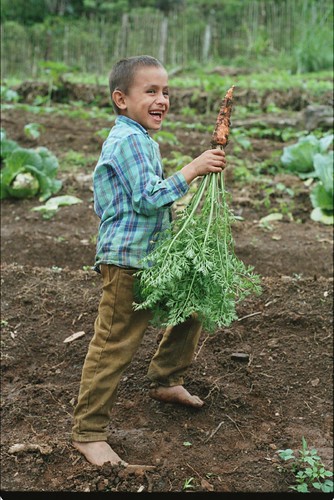Last month, I received an email from Jessica Schessler, a young American student who is interning this summer for Sustainable Harvest International, a small nonprofit organization that is trying to buck this agricultural trend. I asked Jessica (that's her below, drinking - I think it's a safe bet - a cup of fair-trade java) what motivated her to get involved with SHI. She replied:
 “As a college student, I was looking for summer work and really wanted something different than retail, sales, etc.. I've always wanted to do something that made me feel like I made some sort of difference....Now, I've learned so much about what they do, about the environment, and about how we impact the world that I've started to change my everyday habits for the better. I certainly wouldn't expect all of that would've happened working fast food or customer service!”
“As a college student, I was looking for summer work and really wanted something different than retail, sales, etc.. I've always wanted to do something that made me feel like I made some sort of difference....Now, I've learned so much about what they do, about the environment, and about how we impact the world that I've started to change my everyday habits for the better. I certainly wouldn't expect all of that would've happened working fast food or customer service!”
Jessica asked me if she could write about SHI in the Ethical Eating blog. After visiting the SHI website and being very impressed with the kind of work they do (and their 4-star rating from Charity Navigator), I agreed. Here's what Jessica wrote:
Becoming green and saving the environment has become quite the hot topic. Plenty of people and organizations try to remedy these issues at home and abroad as well, but where some fall short is making sure that the programs they place are not just good for the Earth, but for the people in the area as well. Sustainable Harvest International is heading straight for one source. This small non-profit organization “has worked with nearly 1,000 families and 900 students in Honduras, Panama, Belize and Nicaragua implementing alternatives to slash-and-burn farming, the leading cause of rainforest destruction in the region.” Malnutrition is a huge problem in this area of the world, and many vegetables are considered a luxury item. SHI teaches new farming techniques to the local families, such as alley cropping, organic vegetable gardening, and seed saving and storage.
Since 1997, SHI has successfully:
Planted more than 2,000,000 trees.
Converted 6,000 acres to sustainable uses, thereby saving 30,000 acres from slash-and-burn destruction.
Improved nutrition through the establishment of more than 200 organic vegetable gardens.
Increased farm income up to 800%.
Built 165 wood-conserving stoves (saving 1,650 trees per year)
Cruz Alcidez has worked with SHI for 5 months, “I began working with SHI because I wanted to learn new planting techniques and also to learn about sustainability. I am especially thankful to SHI because I now have timber-yielding trees that will remain forever on my farm. The benefits for my family are many, because SHI supplied me with many seeds including beans, cabbage, beets, and soy beans. As you know, this last one (soy) can be used to prepare a lot of different foods, including cuajada, a type of soy cheese, which is very nutritious for my family.”
What better way to stop slash and burn than with education in alternative farming techniques? SHI’s programs not only help out the farmers and their families, but the environment as well.
Now, did you know that it’s possible to eat yogurt, help these farmers, save forests, and get free organic chocolate and tea all at the same time? Stonyfield Farm is featuring SHI along with two other non-profits on their yogurt lids this summer. Vote for your favorite non-profit and help direct funds their way, while getting cool prizes!
Visit http://www.sustainableharvest.org/yogurt/ for more information on SHI and Stonyfield’s “Bid With Your Lid” program.
Jessica Schessler
_______________________________
I do have to point out the irony that yogurt made from milk from nonorganic dairies is being used to promote and (hopefully) help finance the ethical agricultural efforts of SHI. Stonyfield Farm's yogurt is rBST-free, which means the cows in the dairies they source their milk from are not fed a growth hormone that would make them more productive at the expense of their health and well-being (and possibly the health of people who eat it). But those dairies aren't organic, which means the cows are probably treated as milk machines - essentially slave labour.
On the positive side, Stonyfield also offers organic yogurt. The cows in certified organic dairies are treated better and may even be treated very well in some, but most of their newborn calves are ripped away from them within days of birth to be sold to the veal industry - nothing pretty or respectful of life there. Much more hearteningly, Stonyfield's O'SOY yogurt, which is made from organic soybeans and other organic ingredients, is also sporting a "bid with your lid" this summer. That one gets my bid.
Syd Baumel
